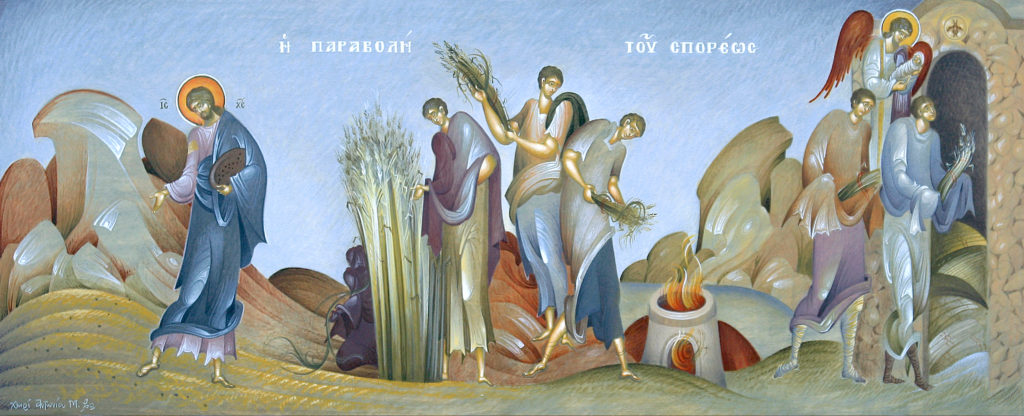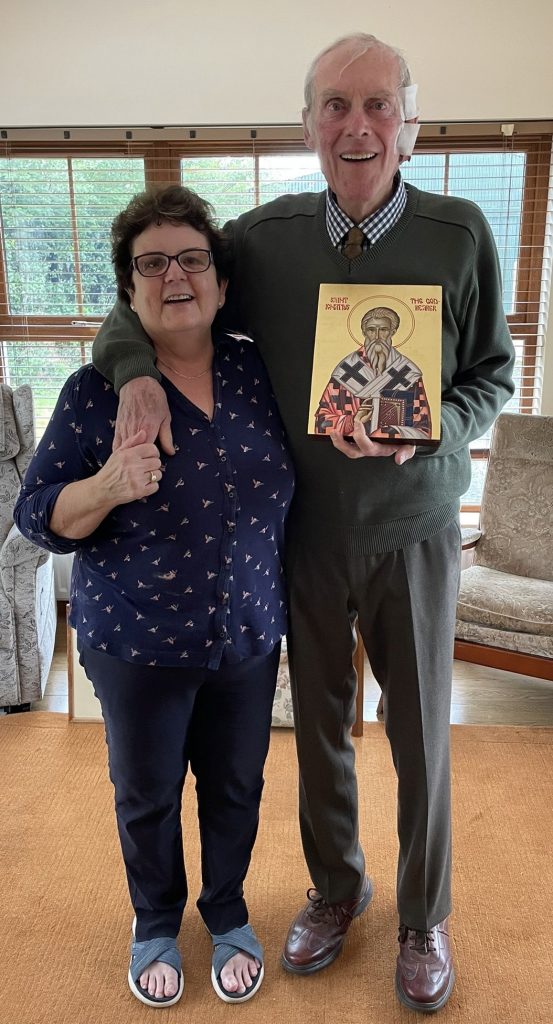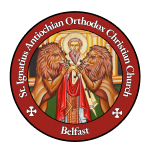Dear Brothers and Sisters,
This is weekly newsletter #19 of the St Ignatius Parish in Belfast
Contents of this Newsletter:
- Message from Fr Dmitry: New Ecclesiastical and Academic Year
- News and Announcements
- Homily on the upcoming Sunday’s Gospel: For God so loved the world
Message from Fr Dmitry: New Ecclesiastical and Academic Year
Dear brothers and sisters,
The 1st of September marked the beginning of the new Ecclesiastical (Church) Year. Unlike the civil calendar, which runs from January to December, the Church follows the ancient tradition of reckoning the year from September to August.
In the world around us, experts, politicians, companies, and media outlets mark the end of the year with reports, reviews, and summaries of their activities. They highlight the year’s achievements and failures. We pay attention to these things in December (or in April if we follow the UK tax year).
By contrast, the ecclesiastical year can feel like something distant to us, simply a background for the services of the Church. But perhaps we can learn from the world here: should we not also take stock of the year just past, and ask ourselves what fruit we have borne spiritually?
It is no coincidence that the Church’s year is tied to the agricultural cycle. In August, at the Feast of the Transfiguration, we bless the first fruits of the harvest. Historically, peasants would reap the crops they had labored over all year. The Gospel itself is rich with harvest imagery: Christ speaks of the fields ready for reaping but with few laborers (Matthew 9:37–38; Luke 10:2). He tells the parable of the sower, whose seed falls on different kinds of soil (Matthew 13:3–9). The parable of the wheat and the tares (Matthew 13:24–30) also speaks of the final harvest.
So, let us look at our own harvest. What have we done for our souls this past year? Did we grow the fruits of the Holy Spirit: love, joy, peace, forbearance, kindness, goodness, faithfulness, gentleness and self-control? (Galatians 5:22-23) Or did we allow the weeds of sin to choke our spiritual life? Did we labor to cleanse our hearts through prayer and repentance? Or did we take the services of the Church for granted, without striving daily to speak with God and repent sincerely? Did we show mercy to others, or did we mostly demand mercy and justice for ourselves?
These are not easy questions. It may be painful to face the truth. A year can feel short, and we may assume we have many more ahead. But do we? The Lord may call us from this life at any moment, “like a bridegroom coming at midnight” (Matthew 25:6). Are we ready to let another year slip by unused?
If you have made progress in the spiritual life this past year, then thank God, and continue with even greater zeal! If you have not, please do not despair, but begin today! The new ecclesiastical year has already begun. Let us not waste a single day.
The Church year also begins at the same time as the new academic year. Many of our parishioners and catechumens are starting school or university. I wish them every success, and I encourage all of you to pray for your children in their studies. But father, let us remember, as parents (and I say “us” because I am also a parent), that our first desire should be for our children to grow as good Christians. All the knowledge in the world and the highest academic marks will be empty and useless if, in gaining them, they lose their hearts. Let us therefore teach them faith, humility, perseverance, mercy, and love, and also be merciful and patient with them, recognizing how hard they work.
May God bless you all in this new year, both in your studies and in your spiritual harvest!
The Orthodox Church offers beautiful prayers for pupils and students. I encourage you to pray them with your children before school. If they are old enough, encourage them to pray these prayers on their own. And if you yourself are studying, make them part of your prayer as well.
A Prayer for Success in Studies
O Lord our God, who hast honored man with thine image divine and endowed him with reason, and who givest wisdom to those who ask: Do thou thyself now look down upon me, thy servant, and enlighten my mind and establish my heart to receive instruction, to be diligent in study and to achieve good success, with the aid of thy divine grace. Grant that I may employ my learning unto every good work and follow thy holy and perfect will, favorably unto thy good pleasure. For thou art our God, and to thee do we offer up glory, to the Father and to the Son and to the Holy Spirit, now and ever, and unto ages of ages. Amen.
A Prayer at the Commencement of Any Task
Almighty God, our Help and Refuge, Fountain of wisdom and Tower of strength, who knowest that I can do nothing without thy guidance and help; assist me, I pray thee, and grant me divine wisdom and power, that I may accomplish this task, and whatever I may undertake to do, faithfully and diligently, according to thy will, so that it may be profitable to myself and others and may be to the glory of thy holy name. For thine is the kingdom and the power and the glory, of the Father and of the Son and of the Holy Spirit, now and ever, and unto ages of ages. Amen.

News and Announcements:

- Athanasius (Colin) and Arlene Receive Their Farewell Gift: Our beloved longtime parishioners, Athanasius (Colin) and Arlene, have now moved to Scotland. We already bid them farewell at our last Sunday service in July, but one part was still missing. On Saturday, 30th August, our catechumen Michael – who, along with others, had been helping Colin and Arlene pack and prepare for their move – presented them with a hand-painted icon of our patron, Saint Ignatius of Antioch. The icon was commissioned by several of our parishioners and offered on behalf of the whole community. It was beautifully written by Romanian iconographer Georgiana Sidoriuc.
We wish Colin and Arlene a blessed time in Scotland, surrounded by their children, and we continue to keep them in our prayers. May St Ignatius intercede for them. We also warmly thank Georgiana for the beautiful icon, which she written and sent to us so promptly. - Weekly Online Faith & Fellowship Meetings on Wednesdays: Join us for our next regular weekly Zoom meeting on Wednesday, 3rd of August, at 7:00 PM (UK time): https://ucl.zoom.us/j/97707660214 This week, we will pray the Little Compline and discuss the Gospel Reading for the upcoming Sunday: https://www.antiochian.org/epistleliturgicday/4304
- Archdiocesan Retreat 2025, 24-27th October: The second annual Archdiocesan Retreat will take place 24–27 October 2025 at the Othona Community, Bradwell-on-Sea. The theme selected by His Eminence, Metropolitan Silouan, for this year is “The Church as Family – Strengthening Bonds in Christ.” I warmly encourage all of you to attend the retreat! To secure you place, complete a fast registration form here: antiochian-retreats.org/register
What to expect: A weekend of fellowship, inspiring talks, workshops, prayer, and activities for all ages in a beautiful setting. Speakers include Metropolitan Silouan, Archimandrite Philip Hall, and Fr Jonathan Hemmings. More info: antiochian-retreats.org
Cost: £250 per adult (meals and accommodation included). Children’s prices are reduced. Limited financial assistance is available through the archdiocese. As treasurer of the Retreat, I am happy to explain what help is available—so please don’t let cost prevent you from attending.
Travel: I know we are the most distant parish and travel involves both flights and ground transport. Do not worry! If you can get to one of London’s airports, the Retreat team will help to arrange easy onward transport to and from the venue. Car-pooling, lifts, train support, and station pick-ups will all be organised.
Next Sunday’s Gospel Reading and Homily: For God so loved the world
The reading from the Holy Gospel according to St John (3:13-17):

The Lord said, “No one has ascended into heaven but he who descended from heaven, the Son of man who is in heaven. And as Moses lifted up the serpent in the wilderness, so must the Son of man be lifted up, that whoever believes in him may have eternal life. For God so loved the world that he gave his only Son, that whoever believes in him should not perish but have eternal life. For God sent the Son into the world, not to condemn the world, but that the world might be saved through him.”
Homily: For God so loved the world
In the Name of the Father, and of the Son, and of the Holy Spirit.
This coming Sunday, the 7th of September, is known as the Sunday before the Feast of the Exaltation (Elevation) of the Holy Cross, which we celebrate on the 14th of September. In preparation, the Church gives us a short Gospel passage, only four verses, that reflects on the deep meaning of the Crucifixion.
It all comes down to one line spoken by Christ: “For God so loved the world, that He gave His only Son, that whoever believes in Him should not perish but have eternal life.”
Brothers and sisters, this is the very essence of our faith. We preach the saving Passion and Resurrection of our Lord Jesus Christ. God died for us and rose again so that we might have eternal life.
In the Old Testament humanity lived under the curse of death. Because of Adam and Eve’s transgression and their expulsion from Paradise, the souls of the departed, even the righteous, were cut off from the presence of God. They went to Sheol, Hades, a shadowy waiting place without vision of God. Life on earth seemed to be the only blessing. The more years granted, the clearer the sign of God’s favor.
But with Christ’s Incarnation, Crucifixion, Resurrection, and Ascension everything changed. Humanity was reconciled to God. The gates of Paradise were opened again. Life on earth was revealed as a passage, not the destination. Eternal life with God became possible, because He loved us and endured death on the Cross, taking on Himself pain, suffering, and sin for the redemption of the world. This is something both tremendous and incomprehensible, yet it is true and expressed in this one sentence from the Gospel.
There is more in this passage. Consider the contrast between the Old and the New Testament. In the Old Testament, when the Jewish people began living under the Law given to them by God, transgression was punished immediately. Saint Theophylact of Ohrid, in his commentary on this Gospel, writes: “The chief purpose of the Mosaic law was to rebuke sin and condemn transgressors [see Rom. 3:20]. No one was forgiven under the law; rather, it called for punishment to be applied as soon as the sinner was identified.”
In contrast Christ says: “For God sent the Son into the world, not to condemn the world, but that the world might be saved through him.” What does this mean? It means that the Lord, in His first coming, came to preach and to turn people towards Him, to redeem them, and to give them time. He showed, by His own example the way of the Christian life. Love and mercy prevailed over punishment. It will only be at His Second Coming that Christ will come to judge. That judgment will be perfectly just, because those who had heard and had all the tools of repentance and salvation before them, but rejected them and turned away from God, will have made a conscious choice. By their own free will they chose to be away from God. Why then should they enter eternal life with Him?
We live in a blessed time that God has given us for repentance, for good works, for showing love and mercy and compassion. He purchased this time for us with His own blood. The One who was unjustly crucified delays the justice due to us because “God so loved the world” and still loves and will always love us.
Are we going to throw this gift away? Are we going to wipe our feet on it?
Yours in Christ,
Fr Dmitry
